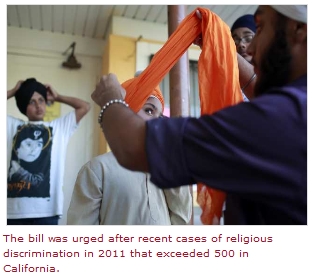Californian Muslims and Sikhs have won right to wear turbans, bears and hijabs in their work places freely without any restrictions according to a new bill signed by the state governor.
 "This bill, AB 1964, makes it very clear that wearing any type of religious clothing or hairstyle, particularly such as Sikhs do … is protected by law and nobody can discriminate against you because of that," Governor Jerry Brown told some 400 Sikhs and supporters at a rally of the North American Punjabi Assn. on the steps of the Capitol, Los Angeles Times reported on Sunday, September 09.
"This bill, AB 1964, makes it very clear that wearing any type of religious clothing or hairstyle, particularly such as Sikhs do … is protected by law and nobody can discriminate against you because of that," Governor Jerry Brown told some 400 Sikhs and supporters at a rally of the North American Punjabi Assn. on the steps of the Capitol, Los Angeles Times reported on Sunday, September 09.
The Workplace Religious Freedom Act, Assembly Bill 1964 by Assemblywoman Mariko Yamada, D-Davis, ensures that employees receive equal protection under law, protecting workers who wear turbans, hijabs and beards.
Named after the federal Civil Rights Act of 1964, the bill was urged after recent cases of religious discrimination in 2011 that exceeded 500 in California.
The cases included a Muslim woman who sued Disneyland last month, alleging that she was fired from a hostess position after refusing to remove her head scarf at work.
Another Senate Bill 1540, sponsored by Sen. Loni Hancock, D-Berkeley, was also signed by Brown.
The bill changes how history and social sciences are taught in schools so that students learn about the history, tradition and theology of California Sikhs.
Education can blunt hatred, prejudice and fatal misunderstandings, such as the massacre of Sikhs outside a Wisconsin temple, Brown said.
The new history curriculum would include "the role and contributions of the Sikh community in California," Brown said.
Islam sees hijab as an obligatory code of dress, not a religious symbol displaying one’s affiliations.
Sikhs are also obliged to wear five symbols at all times, including turbans and no hair cut (for adult males) and iron bracelet; Kara (for women).
According to Sikhism, such symbols are worn for identification and representation of the ideals of Sikhism.
But young Sikh men are now increasingly cutting their hair short and shunning the turban completely in favor of fashion.
Welcomed
The new bills won applause from Muslim and Sikh communities in California.
"It's needed because Sikhs and other religious minorities continue to experience job discrimination on account of their religion,” Rajdeep Singh, director of law and policy for the Sikh Coalition, a national civil rights group based in New York City, told LA Times.
Singh referred to a series of cases which witnessed employers’ failure to accommodate the religious practices of workers.
A study by the coalition found that 12% of Sikhs in the San Francisco Bay Area have been subjected to some form of workplace discrimination.
The new law restricts employers from segregating a worker from customers or the public as a means of accommodating his or her religious beliefs.
It says employers must accommodate a worker's religious practices unless doing so creates "significant difficulty or expense.”
It also protects minorities’ right to don religious dress.
"An employee should not have to work in the back of the store in order to observe his or her faith,” said Assemblywoman Mariko Yamada (D-Davis), who wrote the bill.
Mark Rosenbaum, an attorney with the ACLU of Southern California who represents the Muslim woman in her case against Disneyland, said his Muslim client has a solid case of discrimination, but the new law "adds another layer of protection.”
Coming into effect on January 1, 2013, supporters hope the new measure would pressure law-enforcement agencies and the California Department of Corrections and Rehabilitation to reconsider their workplace practices.
These practices include a current ban on beards and turbans for prison guards.
The United States is home to about 500,000 Sikhs, nearly all of Indian origin.
Unofficial estimates put the number of Muslims in the US at between six to seven million.
